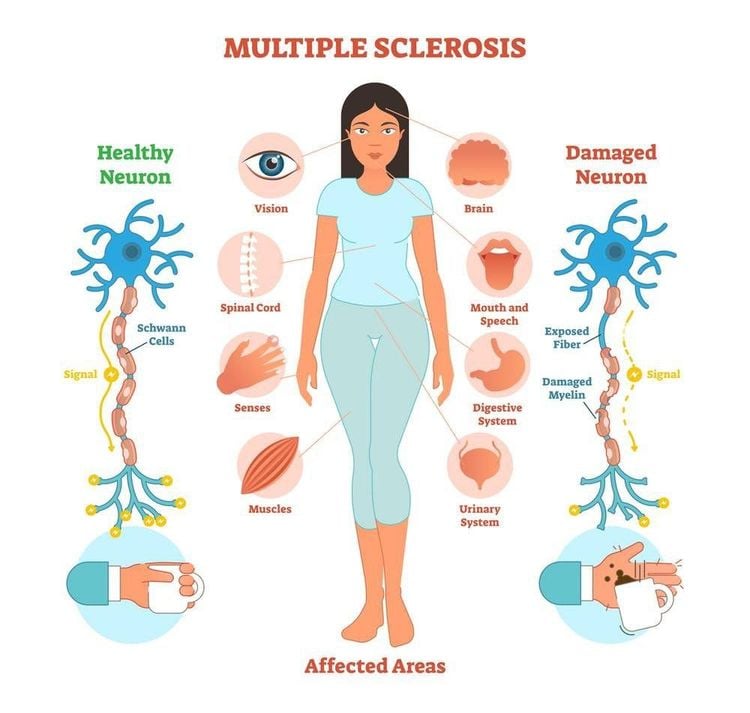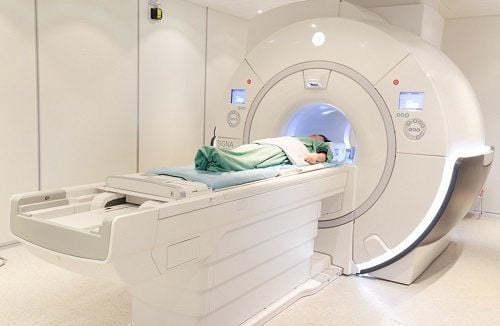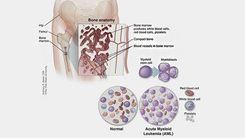Multiple sclerosis is a disease that causes vision problems, numbness and tingling, muscle weakness, and other problems. It happens when the body's infection-fighting system attacks and damages nerve cells and their connections in the brain and spinal cord.
When the body's infection-fighting system, called the "immune system," attacks the body's own cells, it is called an "autoimmune response." It causes damage to myelin, the protective coating around the nerves. When myelin is damaged, messages can no longer be clearly transmitted from the brain and spinal cord to other parts of the body. Many people refer to multiple sclerosis as "MS."
There are several types of MS
- Relapsing-remitting – This means the symptoms of MS come and go. When the symptoms flare up, it is called an "attack" or "relapse." These attacks can last for days to weeks and usually get better slowly. In between attacks, people often feel pretty normal. But some people have problems that last even after an attack gets better. Relapsing-remitting is the most common type of MS.
- Secondary progressive – This means the symptoms come and go at first but then begin to steadily get worse. This happens to many people who start out with relapsing-remitting disease.
- Primary progressive – This means the symptoms steadily get worse from the beginning.
- Progressive relapsing – This means the symptoms steadily get worse, and on top of that there are also attacks that come and go.

What are the symptoms of MS?
The condition can cause many symptoms, but not everyone with MS has all of them. Plus, the symptoms of MS can also be caused by problems other than MS. In general, MS symptoms can include:
- Numbness, tingling, and feeling "pins and needles"
- Muscle weakness or spasms, which can cause you to drop things or fall
- Vision problems, eye pain, and odd eye movements
- Feeling dizzy or off-balance, which can cause you to fall
- Trouble walking or speaking
- Problems controlling your bowels or bladder
- Sex problems
- Sensitivity to heat, which makes symptoms worse
- Trouble thinking clearly
Most people with MS have only a few of these symptoms. But people with severe MS can have most or all of them.
What are the tests for MS?
If your doctor suspects you have MS, he or she can order an MRI of your brain and sometimes your spinal cord. An MRI is an imaging test that creates pictures of the inside of your body. This test can show whether your nerves are damaged. Even so, this test might not be able to show right away if you have MS. In many cases, doctors can diagnose MS only after seeing how symptoms and test results change over time. In other cases, you may need blood tests to check for diseases that can be similar to MS.
In addition to these, other tests can be performed as below;
- lumbar puncture (sometimes called a "spinal tap") – During this procedure, a doctor puts a thin needle into your lower back and removes a small amount of spinal fluid. He or she then checks the fluid for signs of MS.
- evoked potentials – This is a way for the doctor to look at the electrical signals in your brain and spinal cord. It involves sticking small "electrodes" to your skin. The doctor can then measure the nerve signals in your brain while you look at lights, listen to sounds, or feel a mild electrical current.
- Optical coherence tomography – This test uses a special light to look at the inside of your eyes for signs of MS.

How is MS treated?
There is no cure for multiple sclerosis. Treatment typically focuses on speeding recovery from attacks, slowing the progression of the disease and managing MS symptoms. Some people have such mild symptoms that no treatment is necessary. When MS attacks occurs, corticosteroid or plasma exchange can be used.
Corticosteroids: such as oral prednisone and intravenous methylprednisolone, are prescribed to reduce nerve inflammation. Side effects may include insomnia, increased blood pressure, mood swings and fluid retention.
Plasma exchange (plasmapheresis): The liquid portion of part of your blood (plasma) is removed and separated from your blood cells. The blood cells are then mixed with a protein solution (albumin) and put back into your body. Plasma exchange may be used if your symptoms are new, severe and haven't responded to steroids.
In order to modify disease progression, we can use many new drugs but most of them are not available yet in Vietnam, and have high risk of side effects. Recently, autologous hematopoietic stem cell transplantation (HSCT) has been tried for MS patients who has relapsing-remitting clinical course.
What is HSCT for multiple sclerosis?
HSCT attempts to “reboot” the immune system, which is responsible for damaging the brain and spinal cord in MS. In HSCT for MS, hematopoietic (blood cell-producing) stem cells, which are derived from a person’s own (scientifically referred to as “autologous”) bone marrow or blood, are collected and stored, prior to depleting much of the immune system using chemotherapy drugs. Then the stored hematopoietic stem cells are reintroduced to the body. The new stem cells migrate to the bone marrow and over time reconstitute the immune system. HSCT can come down autoimmune reaction and symptom relapse for long time. Our unit of Hematology and Cell therapy in Vinmec International hospital has started to treat MS patient with HSCT.







